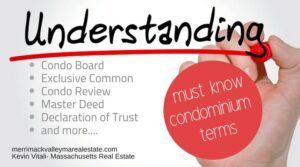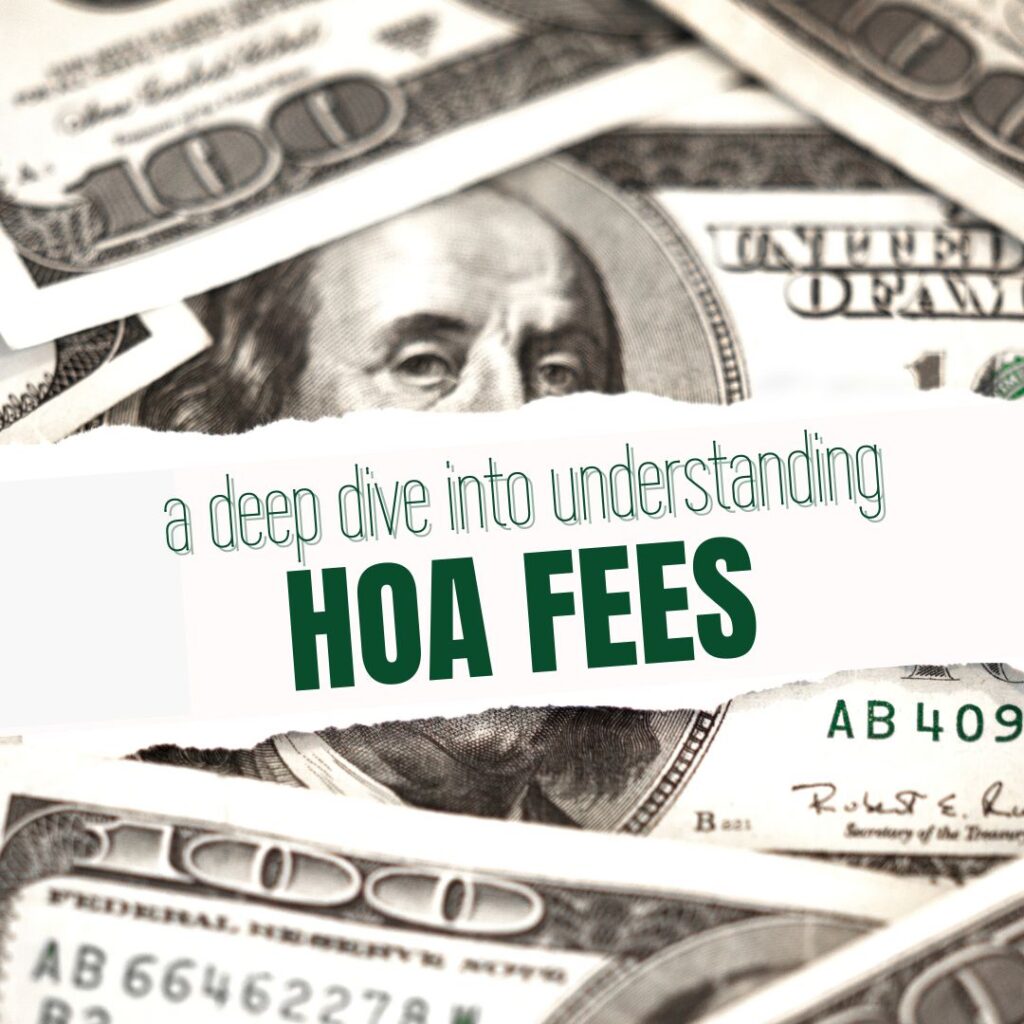Home » Kevin Vitali Massachusetts REALTORS-Real Estate Blog » Buying A House » Condominium Terms and Definitions You Must Know When Buying a Condo
Condominium Terms and Definitions You Must Know When Buying a Condo
 Condominiums are becoming more and more popular for home buyers. The cost is generally lower than a single family home and much of the maintenance is usually taken care of by the home owner’s association.
Condominiums are becoming more and more popular for home buyers. The cost is generally lower than a single family home and much of the maintenance is usually taken care of by the home owner’s association.
Your condominium is a bigger part of a whole and their is a legal structure behind it as well that needs to be governed as people are brought together in ownership.
So when you buy a condominium there is a whole set of language that may be new to you. The article will cover some of the condominium definitions you may need to know. Some of the terms may be specific to Massachusetts Condominiums.
Condominium Terms You Must Know When Buying a Condo
As a future owner of a condominium it is important to know these terms. Many of the terms refer to documents that would be wise to review before purchasing a condominium, so you know exactly what you a in for when purchasing a condo.
It is typical for your buyer’s agent to attach language for a buyer to have a certain amount of time to review the condominium documents like the master deed, declaration of trust, budget, bylaws and rules and regulations.
Board of Directors
The board of directors in larger complexes are elected and govern the HOA. They make the everyday decisions to keep your HOA and complex running smoothly. The board of directors duties can include enforcing the rules, assessing finances, changing the bylaws and rules as necessary, establish a reserve and directing the management company.
Budget
The budget is the condominiums guide to making financial decisions. It predicts the expenses for the upcoming year. It shows how much money is predicted in income from HOA fees, late fees, usage fees etc…. and than expenses are proposed for various line items such as landscaping, electric bill, management fees, etc…
Bylaws
The bylaws are usually part of the declaration of trust and they are the rules that govern the the operation operation of the board of trustees. Generally covering elections, length of service, voting, responsibilities and such.
Common Area
A common area is paid for and used by everyone. A common area can include pools, tennis courts, parking lots, walkways, landscaping and grounds. Everyone owns a share in the common area and gets to use the common areas.
Condominium
A condominium is a dwelling or residence that is individually owned. But a condominium typically shares common areas and expenses. Common areas could be parking lots, roofs, pools, walls. plumbing etc…. Each owner will be assigned a percentage share of common areas usually based on square footage.
Condo Questionnaire
The condo questionnaire is a document requested by a bank that is financing an individual unit. The questionnaire is used to make sure the condominium meets it’s underwriting guidelines. The bank will want to know if there is pending litigation, the percentage of home owners that are late on their condo fees, how much money is sitting in reserves and more.
The point of the questionnaire is to ascertain the stability of the condominiums finances.
Declaration of Trust
The Declaration of Trust lays out the formation of the condominium board. The document lays out their responsibilities and how they are to govern the HOA.
Exclusive Use
There may be common areas that are designated as exclusive use to one owner. A deck off a unit is typically an exclusive common area. The maintenance is paid for by everyone, but only that one owner has the use of the deck.
Home Owners Association
A home owners association is a group that directs, manages and enforces the rules of the condominium as spelled out in the Declaration of Trust. Often referred to as an HOA. By buying in a condominium you are automatically are a member of the HOA.
HOA Fee
Your HOA fee or Condo fee is typical a monthly fee you send into your management company. It goes towards ongoing maintenance. It covers thing like snow removal, garbage removal and management. All your monthly ongoing expenses will be covered as well as a portion being put into reserve funds for any large maintenance projects or emergency repairs.
Management Company
The HOA will hire a management company to manage the daily operations of running a condominium complex. There duties could be collect condo fees, accounting, hire vendors for snow removal, trash removal, landscaping etc… While the HOA decides what needs to be done for the common good of the condominium complex, the management company executes the operations.
Meeting Minutes
Meeting minutes are a recap of what is discussed during board and association meetings to keep members of the HOA informed.

Master Deed
The master deed is the document that describes what is an individuals property and responsibility and what ares are common areas. Typically a unit owner in a condominium complex owns from inside stud to inside stud. But than who owns the roof or is responsible for the roof above. Or what about water pipes, or electrical in the wall.
Referring back to the master deed will clearly state who owns and who is responsible for maintaining certain areas through out the complex.
Owner Occupant/ Non Owner Occupant
Pretty self descriptive but an owner occupant lives in the unit they purchased where a non-owner occupant typical rents the unit out.
Owner Occupied Ratio
The ratio of owner occupants to non-owner occupants. Lenders are particularly concerned with this ratio when lending on a unit. The higher the occupancy of owners the better for the bank. Owners tend to want to take better care of a property they live in.
Some condominiums will only allow a certain percentage of units to be non-owner occupied as spelled out in their bylaws.
Reserve Funds
A reserve fund is established for long term maintenance or unexpected emergencies. A portion of your monthly HOA fee should be funding a reserve fund in a well established complex. A well managed complex will have money every month from your condo fee go into reserve based upon projected long term maintenance projects.
Rules and Regulations
The rules and regulations are what specifically what a unit owner can or cannot do. They usually discuss noise levels, pet policies, satellite dishes, parking and so on. The goal of the rules and regulations are to allow all owners peaceful enjoyment and to maintain a uniform look
Special Assessments
It is impossible to predict every repair. Items can fail earlier than expected or unforeseen damage can occur such as trees falling down in a windstorm, etc… The board will need to borrow money if the repair is costly. Each owner will then be responsible to hlep repay that loan on a monthly basis.
Townhouse
A townhouse is a style of condominium. It will be a unit that has no other unit above or below but it can have a unit on either or both sides.
Final Thoughts On Condominium Terms
Because you have a group of people who have shared ownership there needs to be clear rules and a some way of governing the finances and the well being of the complex.
If you are financing your condominium, the bank will be requesting some of these documents in order for you to secure financing on your unit. It is important to know what these condominium terms are, in order to have an understanding of what you are purchasing before your purchase.
If a problem should arise after purchasing your condos, many of the documents and board members will help resolve the issue..
Other Condominium Buying Resources
- Bill Gassett Buy a Single Family Home or a Condominium?
- Debbie Drummond Is Condo Living Right for You?
- Kyle Hiscock 10 Tips for Buying Your First Condo
- Conor MacEvilly What To Ask When Buying A Condo
Condominium Terms You Must Know When Buying a Condo is written by Kevin Vitali of EXIT Group One Real Estate. If you would like to sell your home or buy a new home give me a call at 978-360-0422 and let’s get the process started.
Real Estate Services in the following areas: Northeast Massachusetts, Merrimack Valley, North Shore and Metrowest. Including the following communities and the surrounding area- Amesbury, Andover, Billerica, Burlington, Chelmsford, Dracut, Groveland, Haverhill, Lowell, Melrose, Merrimac, Methuen, Middleton, North Andover, North Reading, Reading, Stoneham, Tewksbury, Tyngsborough, Wakefield, Wilmington, Westford




